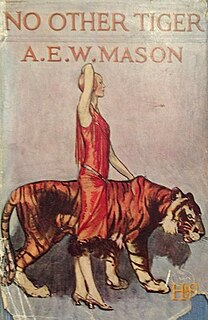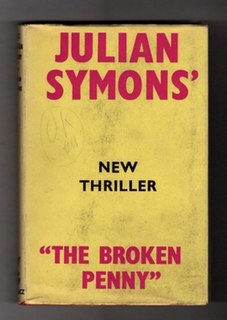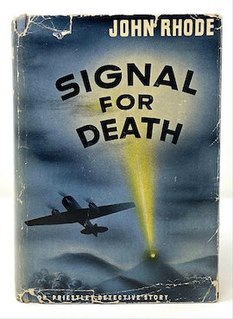
The Fallen Curtain is a collection of 11 short stories by British writer Ruth Rendell. The title story won the MWA Edgar Award for Best Short Story of the Year in 1975. The book was first published in the UK in 1976 by Hutchinson. All stories – with the exception of People Don’t Do Such Things, The Vinegar Mother and Divided We Stand – were first published in Ellery Queen's Mystery Magazine in the early to mid-1970's.
Henry Francis Maltby was a prolific writer for the London stage and British cinema from after the First World War, until the 1950s. He also appeared in many films.

A curtain wall is a defensive wall between two fortified towers or bastions of a castle, fortress, or town.
Alan Emlyn Williams was an ex-foreign correspondent, novelist and writer of thrillers.
The Iron Curtain was the defensive line of Rangers F.C. during the late 1940s and early 1950s. The normal line-up in the early 1950s consisted of goalkeeper Bobby Brown, full backs George Young and Jock Shaw, centre half Willie Woodburn and wing halves Ian McColl and Sammy Cox. These positions refer to the old 3-2-5 formation, where the three defenders would mark the two opposing wingers and centre forward, while the wing-halves dealt with the opposing inside forwards. These direct match-ups meant that Rangers' Iron Curtain had several great confrontations with Hibs' Famous Five forward line of Gordon Smith, Bobby Johnstone, Lawrie Reilly, Eddie Turnbull and Willie Ormond.

Raymond Chandler (1888–1959) was an American-British novelist and screenwriter. He was born in Chicago, Illinois and lived in the US until he was seven, when his parents separated and his Anglo-Irish mother brought him to live near London; he was educated at Dulwich College from 1900. After working briefly for the British Civil Service, he became a part-time teacher at Dulwich, supplementing his income as a journalist and writer—mostly for The Westminster Gazette and The Academy. His output—consisting largely of poems and essays—was not to his taste, and his biographer Paul Bishop considers the work as "lifeless", while Contemporary Authors describes it as "lofty in subject and mawkish in tone". Chandler returned to the US in 1912 where he trained to become an accountant in Los Angeles. In 1917 he enlisted in the Canadian Expeditionary Force, saw combat in the trenches in France where he was wounded, and was undergoing flight training in the fledgling Royal Air Force when the war ended.

The South Bastion was part of the fortifications of Gibraltar, protecting the western base of the Charles V Wall. It was originally built by Spanish military engineers, later improved by the British. The South Bastion stands at the south end of the Line Wall Curtain which defends the town from attack from the Bay of Gibraltar. Another curtain wall runs east from the bastion to the base of a precipice. This wall is pierced by the Southport Gates, guarded by the South Bastion and the Flat Bastion on either side.
Events from the year 1933 in Scotland.

A Man About a Dog is a 1947 thriller novel by the British-Australian writer Alec Coppel. Driven to distraction by his wife's repeated affairs, her husband decides to kidnap her latest lover and commit the perfect murder, only to be thwarted by a dog.
Paper Orchid is a 1948 crime novel by the British writer Arthur La Bern. He had made his name three years earlier with It Always Rains on Sunday and also enjoyed success with this novel set amongst newspaper journalists on Fleet Street.

Mr. Denning Drives North is a 1950 thriller novel by the British-Australian writer Alec Coppel. When successful and happily married aircraft manufacturer Tom Denning attempts to commit suicide by crashing a plane, detectives uncover a murder in his past background that has driven him insane with guilt.

The Toff Goes to Market is a 1942 crime thriller novel by the British writer John Creasey. It was the eighth in his long-running featuring the gentleman amateur detective The Toff. It was one of a number of novels produced in the era that featured the booming wartime black market as a major plotline. It has been republished on a number of occasions.

No Other Tiger is a 1927 mystery thriller novel by the British writer A.E.W. Mason. Julius Ricardo, who features in the Inspector Hanaud series, briefly appears and Hanaud himself is mentioned in passing.

The Broken Penny is a 1953 thriller novel by the British writer Julian Symons set during the early Cold War.

The Second Man is a 1956 crime novel by the British writer Edward Grierson. It won the Gold Dagger award of the Crime Writers' Association.

The Cold Dark Night is a 1957 spy thriller novel by the British writer Sarah Gainham. Her second novel, it is set at the height of the Cold War when the 1954 Berlin Conference saw the Big Four foreign ministers arrive in the divided city. Gainham had worked in Berlin as a journalist at the time of the Conference.
Lynn Brock (1877-1943) was the pseudonym of the Irish writer Alister McAllister, who moved to England and wrote a series of mystery novels. Brock is best known for his series of Colonel Gore detective novels, which enjoyed popularity in the 1920s and 1930s during the Golden Age of Detective Fiction. His novels employ a complexity of style and are generally set in rural locations. He also wrote several plays under the name Anthony Wharton.

A Forest of Eyes is a 1950 spy thriller novel by the British writer Victor Canning. Stylistically it owed a debt to Canning's friend, the writer Eric Ambler.

They Watched by Night is a 1941 detective novel by John Rhode, the pen name of the British writer Cecil Street. It is the thirty fifth in his long-running series of novels featuring Lancelot Priestley, a Golden Age armchair detective. It was published in the United States by Dodd Mead with the alternative title Signal for Death.
Salute the Toff is a 1941 crime thriller novel by the British writer John Creasey. It is the sixth in his long-running featuring the gentleman amateur detective The Toff.













